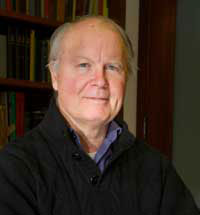Brent Shaw
| Brent D. Shaw | |
|---|---|

Shaw, 2012
|
|
| Born | May 27, 1947 Edmonton, Alberta, Canada |
| Nationality | Canadian |
| Education | BA in Classics and Anthropology (University of Alberta, 1968) MA in Classics and Ancient History (University of Alberta, 1971) PhD in Classics and Ancient History (Cambridge University, 1978) |
| Occupation | Professor of Classics |
| Employer | Department of Classics, Princeton University |
| Spouse(s) | Shauna Shaw (m. 1969) |
| Website | Faculty webpage |
Brent Donald Shaw (born May 27, 1947) is a Canadian historian and the current Andrew Fleming West Professor of Classics at Princeton University. His principal contributions center on the regional history of the Roman world with special emphasis on the African provinces of the Roman Empire, the demographic and social history of the Roman family, and problems of violence and social order.
Shaw received his B.A. and M.A. from the University of Alberta in 1968 and 1971 respectively. He later acquired his Ph.D. from Cambridge University in 1978, completing his dissertation research on pastoral nomadism and state regulation under the supervision of Joyce Reynolds. After an initial post at the University of Birmingham, Shaw taught at the University of Lethbridge in western Canada from 1977–1996, spending a fellowship year at the Institute for Advanced Study in 1994, and two years as a visiting professor at Princeton University in 1989 and 1995. Shaw then took up a professorship at the University of Pennsylvania in 1996, which he held until taking up the Andrew Fleming West professorship of Classics at Princeton University in 2004. In 2012, Shaw was elected a resident member of the American Philosophical Society.
Shaw has written extensively on problems of violence in establishing conditions of peace and order throughout the Roman world, in particular on bandits and brigands, and on sectarian violence. In a series of articles published through the 1980s and 1990s, Shaw provided a novel interpretation of the phenomenon of banditry and of the relationship of autonomy and violence to sustaining state power and force, drawing on Josephus, and engaging critically with the work of British Marxist Eric Hobsbawm. Shaw later shifted his focus to understanding how early Christians produced sectarian or religious violence by the popularization of images of ideological enemies, and through the mobilization of sentiment using both the idea and the practice of martyrdom. His book on the subject, Sacred Violence, was awarded the Wallace K. Ferguson Prize of the Canadian Historical Association for best book in history for 2011, and the PROSE Award for best book in Classics and Ancient History of 2011.
...
Wikipedia
